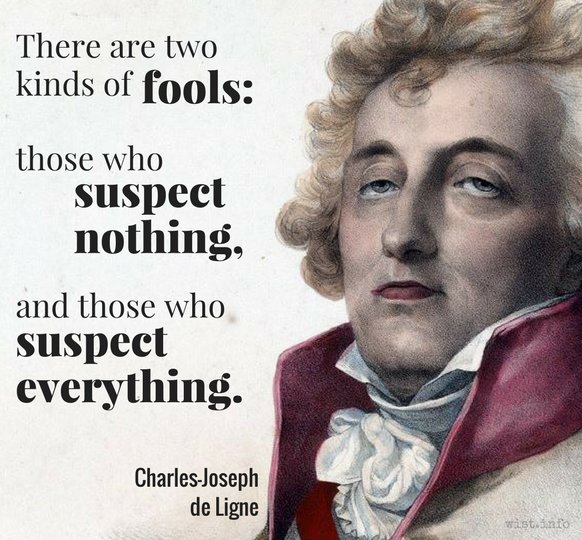But it is just those books which a man possesses, but does not read, which constitute the most suspicious evidence against him. The Spanish Inquisition have deliberated on that point, and have come to a conclusion that places the matter beyond further doubt.
[Mais ce sont précisément les livres qu’un homme ne lit pas qui l’accusent les plus. L’inquisition d’Espagne a jugé ce point, et l’a mis hors de doute.]
Victor Hugo (1802-1885) French writer
Toilers of the Sea [Les Travailleurs de la Mer], Book 1, ch. 4 (1866) [tr. Thomas (1911)]
(Source)
On an inherited book in Latin on the protagonist's bookshelf which, his not knowing Latin, makes folk suspicious. (The book is a 17th Century treatise on rhubarb.)
(Source (French)). Other translations:But it is exactly for those very books that a man does not peruse that he is condemned. The history of the Inquisition has proved this to us.
[tr. Campbell (1887)]But it is just those books which a man does not read which condemn him the most. The Spanish Inquisition passed judgment on this point and placed it beyond a doubt.
[tr. Hapgood (1888)]But it is just those books that a man does not read that provide evidence against him. The Spanish Inquisition considered this point and put the matter beyond doubt.
[tr. Hogarth (2002)]
Quotations about:
suspicion
Note not all quotations have been tagged, so Search may find additional quotes on this topic.
We can gain no lasting peace if we approach it with suspicion and mistrust — or with fear. We can gain it only if we proceed with the understanding and the confidence and the courage which flow from conviction.
Franklin Delano Roosevelt (1882-1945) American lawyer, politician, statesman, US President (1933-1945)
Speech (1945-01-20), Inaugural Address, Washington, D.C.
(Source)
BARABAS:Religion
Hides many mischiefs from suspicion.Christopher "Kit" Marlowe (1564-1593) English dramatist and poet
The Jew of Malta, Act 1, sc. 2, ll. 282-283 (c. 1590)
(Source)
Planning to send his daughter, Abigail, as a penitent to the nunnery that his confiscated house has been turned to, so that she can recover his treasure left hidden there.
A man of self-respect is one who still believes that nobody suspects him.
H. L. Mencken (1880-1956) American writer and journalist [Henry Lewis Mencken]
A Little Book in C Major, ch. 4, § 30 (1916)
(Source)
Variants:SELF-RESPECT. The secure feeling that no one, as yet, is suspicious.
A Book of Burlesques, "The Jazz Webster" (1924)Self-Respect -- The secure feeling that no one, as yet, is suspicious.
Chrestomathy, ch. 30 "Sententiae" (1949)
Not to oversee Workmen, is to leave them your Purse open.
Benjamin Franklin (1706-1790) American statesman, scientist, philosopher, aphorist
Poor Richard’s Almanack (Nov 1751)
(Source)
The biographer does not trust his witnesses, living or dead. He may drip with the milk of human kindness, believe everything that his wife and his friends and his children tell him, enjoy his neighbors and embrace the universe — but in the workshop he must be as ruthless as a board meeting smelling out embezzlement, as suspicious as a secret agent riding the Simplon-Orient Express, as cold-eyed as a pawnbroker viewing a leaky concertina. With no respect for human dignity, he plays off his witnesses one against the other, snoops for additional information to confront them with, probes their prejudices and their pride, checks their reliability against their self-interest, thinks the worst until he is permitted to think better.
Paul Murray Kendall (1911-1973) American academic and historian
“Walking the Boundaries,” The Art of Biography (1965)
(Source)
“When it comes to strangers with guns,” I told her, “I think suspicion is more likely to keep you alive than trust.”
If you want that good feeling that comes from doing things for other folks then you have to pay for it in abuse and misunderstanding.
Zora Neale Hurston (1891-1960) American writer, folklorist, anthropologist
Moses, Man of the Mountain [Moses] (1939)
(Source)
RICHARD: Suspicion always haunts the guilty mind;
The thief doth fear each bush an officer.William Shakespeare (1564-1616) English dramatist and poet
Henry VI, Part 3, Act 5, sc. 6, l. 11ff (5.6.11-12) (1591)
(Source)
The seed had sprouted into that most wonderful and horrible of fruits: doubt, which, like the strawberry, has a succulent taste, but has also a tendency to spread and spread, until it dominates whatever garden it has taken root in.
A wise Man will keep his Suspicions muzzled, but he will keep them awake.
George Savile, Marquis of Halifax (1633-1695) English politician and essayist
“Of Caution and Suspicion,” Political, Moral, and Miscellaneous Thoughts and Reflections (1750)
(Source)
Every boddy in this world wants watching, but none more than ourselves.
[Everybody in this world wants watching, but none more than ourselves.]
Josh Billings (1818-1885) American humorist, aphorist [pseud. of Henry Wheeler Shaw]
Everybody’s Friend, Or; Josh Billing’s Encyclopedia and Proverbial Philosophy of Wit and Humor, ch. 142 “Affurisms: Fust Impreshuns” (1874)
(Source)
We do not easily think ill of those whom we love most, and the taint of suspicion cannot exist along with warm affection.
[Non enim facile de his quos plurimum diligimus turpitudinem suspicamur, nec in vehementi dilectione turpis suspitionis labes potest inesse.]
Peter Abelard (1079-1142) French philosopher, theologian, logician [Pierre Abélard]
Historia Calamitatum Mearum [The Story of My Misfortunes], ch. 6 (1132) [tr. Radice (1974)]
(Source)
On how Heloise' uncle, Fulbert, had no suspicion of her romantic relationship with Abelard.
(Source (Latin)). Alternate translation:Indeed we do not easily suspect shame in those whom we most cherish, nor can there be the blot of foul suspicion on devoted love.
[tr. Bellows (1922)]
The first half of the sentence is most commonly quoted. Other variants include:
- "For it is not easy to suspect vileness in those whom we love most."
- "For we do not easily expect evil of those whom we love most."
Any man who attains a high place among you, from the President downwards, may date his downfall from that moment; for any printed lie that any notorious villain pens, although it militate directly against the character and conduct of a life, appeals at once to your distrust, and is believed. You will strain at a gnat in the way of trustfulness and confidence, however fairly won and well deserved; but you will swallow a whole caravan of camels, if they be laden with unworthy doubts and mean suspicions. Is this well, think you, or likely to elevate the character of the governors or the governed among you?
The Rich knowes not who is his friend.
George Herbert (1593-1633) Welsh priest, orator, poet.
Jacula Prudentum, or Outlandish Proverbs, Sentences, &c. (compiler), # 865 (1640 ed.)
(Source)
Rabid suspicion has nothing in it of skepticism. The suspicious mind believes more than it doubts. It believes in a formidable and ineradicable evil lurking in every person.
Eric Hoffer (1902-1983) American writer, philosopher, longshoreman
Passionate State of Mind, Aphorism 184 (1955)
(Source)
My wife should be as much free from suspicion of a crime as she is from a crime itself.
[Meos tam suspicione quam crimine iudico carere oportere.]
Julius Caesar (100-44 BC) Roman general and statesman [Gaius Julius Caesar]
In Suetonius, Life of Caesar
Popularly, "Caesar’s wife must be above reproach" or "beyond reproach."
Caesar was called to be a witness against Clodius, who was charge with having defiled sacred rites and having an affair with Pompeia, Caesar's wife. Caesar said he had investigated and found out nothing to prove the Pompeia's fidelity. When asked why, then, he had divorced her, he gave this answer.
Alt. trans.: "I judge it necessary for my kin to be as free from suspicion as from the charge of wrongdoing."
Alt. trans.: "I wished my wife to be not so much as suspected." [in Plutarch, “Caesar,” Parallel Lives [tr. Dryden (1693)]].
The awareness of their individual blemishes and shortcomings inclines the frustrated to detect ill will and meanness in their fellow men. Self-contempt, however vague, sharpens our eyes for the imperfections of others. We usually strive to reveal in others the blemishes we hide in ourselves.
Eric Hoffer (1902-1983) American writer, philosopher, longshoreman
True Believer: Thoughts on the Nature of Mass Movements, Part 3, ch. 14, § 100 (1951)
(Source)
I believe that that community is already in process of dissolution where each man begins to eye his neighbor as a possible enemy, where non-conformity with the accepted creed, political as well as religious, is a mark of disaffection; where denunciation, without specification or backing, takes the place of evidence; where orthodoxy chokes freedom of dissent; where faith in the eventual supremacy of reason has become so timid that we are not enter our convictions into the open list, to win or lose. Such fears as these are a solvent which can eat out the cement that binds the stones together; they may in the end subject us to a despotism as evil as any that we dread; and they can be allayed only in so far as we refuse to proceed on suspicion, and trust one another until we have tangible ground for misgiving,
Learned Hand (1872-1961) American jurist
“A Plea for the Open Mind and Free Discussion,” speech, University of the State of New York, Albany (1952-10-24)
(Source)
Risk for risk, for myself I had rather take my chance that some traitors will escape detection than spread abroad a spirit of general suspicion and distrust, which accepts rumor and gossip in place of undismayed and unintimidated inquiry.
Learned Hand (1872-1961) American jurist
“A Plea for the Open Mind and Free Discussion,” speech, University of the State of New York, Albany (1952-10-24)
(Source)
Never regard something as doing you good if it makes you betray a trust, or lose your sense of shame, or makes you show hatred, suspicion, ill will, or hypocrisy, or a desire for things best done behind closed doors.
[Μὴ τιμήσῃς ποτὲ ὡς συμφέρον σεαυτοῦ, ὃ ἀναγκάσει σέ ποτε τὴν πίστιν παραβῆναι, τὴν αἰδῶ ἐγκαταλιπεῖν, μισῆσαί τινα, ὑποπτεῦσαι, καταράσασθαι, ὑποκρίνασθαι, ἐπιθυμῆσαί τινος τοίχων καὶ παραπετασμάτων δεομένου.]
Marcus Aurelius (AD 121-180) Roman emperor (161-180), Stoic philosopher
Meditations [To Himself; Τὰ εἰς ἑαυτόν], Book 3, ch. 7 (3.7) [tr. Hays (2003)]
(Source)
(Source (Greek)). Alternate translations:Never esteem of anything as profitable, which shall ever constrain thee either to break thy faith, or to lose thy modesty; to hate any man, to suspect, to curse, to dissemble, to lust after anything, that requireth the secret of walls or veils.
[tr. Casaubon (1634), ch. 8]Don't be fond of any Thing, or think that for your Interest, which makes you break your Word, quit your Modesty, be of a Dissembling, Suspicious, or Outragious Humour; which puts you upon Hating any Person, and enclines you to any Practice, which wont bear the Light, and look the World in the Face.
[tr. Collier (1701)]Never value that as advantageous, which may force you to break your faith; to quit your modesty, or sense of honour; to hate, suspect, or imprecate evil on any one; to dissemble; or to desire any of these things which need walls or curtains to conceal them.
[tr. Hutcheson/Moor (1742)]Never adopt any measure as conducing to your interest, which lays you under a necessity of violating your honour or your modesty; or may excite your hatred or your suspicion, or provoke you to execrate any one, or to practice dissimulation; or, in short, to entertain a wish which will not bear the light, but must be concealed from the world by walls and curtains.
[tr. Graves (1792)]Never value anything as profitable to thyself which shall compel thee to break thy promise, to lose thy self-respect, to hate any man, to suspect, to curse, to act the hypocrite, to desire anything which needs walls and curtains.
[tr. Long (1862)]Think nothing for your interest which makes you break your word, quit your modesty, hate, suspect, or curse any person, or inclines you to any practice which will not bear the light and look the world in the face.
[tr. Collier/Zimmern (1887)]Never esteem anything as of advantage to thee that shall make thee break thy word or lose thy self-respect.
[tr. Morgan, in Bartlett's (1894)]Never prize anything as self-advantage, which will compel you to break faith, to forfeit self-respect, to suspect or hate or execrate another, to play false, to desire anything which requires screens or veils.
[tr. Rendall (1898)]Never esteem aught of advantage which will oblige you to break your faith, or to desert your honour; to hate, to suspect, or to execrate any man; to play a part; or to set your mind on anything that needs to be hidden by wall or curtain.
[tr. Hutcheson/Chrystal (1902)]Prize not anything as being to thine interest that shall ever force thee to break thy troth, to surrender thine honour, to hate, suspect, or curse anyone, to play the hypocrite, to lust after anything that needs walls and curtains.
[tr. Haines (Loeb) (1916)]Never value as an advantage to yourself what will force you one day to break your word, to abandon self-respect, to hate, suspect, execrate another, to act a part, to covet anything that calls for walls or coverings to conceal it.
[tr. Farquharson (1944)]Never value the advantages derived from anything involving breach of faith, loss of self-respect, hatred, suspicion, or execration of others, insincerity, or the desire for something which hast to be veiled and curtained.
[tr. Staniforth (1964)]Never prize as advantageous to yourself anything that will compel you some day to break your word, to offend against propriety, to hate, suspect or curse another, to dissemble, or to desire anything that needs to be veiled behind walls and curtains.
[tr. Hard (1997 ed.)]Never regard as a benefit to yourself anything which will force you at some point to break your faith, to leave integrity behind, to hate, suspect, or curse another, to dissemble, to covet anything needing the secrecy of walls and drapes.
[tr. Hammond (2006)]Never consider anything to be beneficial to you, which could ever compel you to violate your faith in yourself, to abandon your modesty, to hate anybody, to be overly suspicious, cursing, disingenuous, or to lust after anything which must be hidden behind walls or veils.
[tr. Needleman/Piazza (2008)]Never prize as advantageous to yourself anything that will compel you some day to break your word, to offend against propriety, to hate, suspect, or curse another, to pretend, or to desire anything that needs to be veiled behind walls and curtains.
[tr. Hard (2011 ed.)]Never value as beneficial to yourself something that will force you one day to break your word, abandon your sense of shame, hate, suspect, or curse someone else, pretend, or desire something that needs the secrecy of walls or curtains.
[tr. Gill (2013)]Value nothing which compels you to break your promise, to abandon your honor, to hate, suspect or curse anyone, to be a hypocrite, or to lust after anything which needs walls or decorations.
[tr. @sentantiq (2019)]Never value anything you find profitable, to the extent that you have to break a promise, lose your self-respect, hate any person or act the hypocrite.
[tr. McNeill (2019)]Some causes will force you to betray faith, abandon shame, hate or suspect another person, call down curses, put forward explanations, or desire something that requires walls and fences. Do not regard these causes as necessary or beneficial to yourself.
[Source]



























